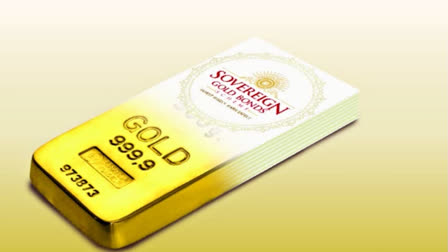Kolkata:Gold, which has given a healthy CAGR of 13 per cent in the last three years, is worth considering as part of one's overall asset allocation and as a hedge against inflation and macroeconomic uncertainties in the form of gold exchange-traded funds (ETFs) and sovereign gold bond (SGB), feels industry experts and analysts. While Indians historically have a love for the yellow metal in the form of gold jewellery, having ETFs and SGBs can help one to hold gold without any additional burden of maintaining a locker at an additional cost and being tensed about the security of the gold jewellery.
Chintan Haria, Principal–Investment Strategy, ICICI Prudential AMC, said, “Buying gold on the auspicious occasion of Akshaya Tritiya is one of the long-held traditions in India. Since the past three years, the yellow metal has delivered a healthy CAGR of 13%. In the future, too, the outlook remains positive. Potential delay in the US Federal Reserve’s interest rate reduction decision, rising geopolitical tensions, expensive domestic equity market valuation and parliamentary election outcomes are all factors due to which gold is likely to remain in the spotlight.”
“Given this scenario, it may be worth considering gold as a part of one's overall asset allocation and as a hedge against inflation and macroeconomic uncertainties. Today, an individual has multiple ways to gain exposure to gold, and the easiest among them is to invest in a Gold ETF. Gold ETF is a convenient and cost-effective way to gain exposure without having to worry about physical ownership or storage. Liquidity, too, is not a matter of concern as units of gold ETF can be bought and sold on the exchanges during trading hours,” Haria added.
What is gold ETF?
Gold Exchange Traded Funds (ETFs) are simple investment products that combine the flexibility of stock investment and the simplicity of gold investments. ETFs trade on the cash market of the National Stock Exchange and Bombay Stock Exchange, like any other company stock and can be bought and sold continuously at market prices. Gold ETFs are passive investment instruments that are based on gold prices and invest in gold bullion. Because of its direct gold pricing, there is complete transparency on the holdings of an ETF. Furthermore, due to its unique structure and creation mechanism, ETFs have much lower expenses as compared to physical gold investments. The Asset Under Management (AUM) of gold ETF has doubled in three years to Rs 33,000 crore in April from Rs 16,508.8 crore in June 2021.
What is a Sovereign Gold Bond?
